Rising star Sogabe survives scare to gain Paris 2024 ticket
Sunday, April 21, 2024 - 13:01 By Ken Marantz

BISHKEK, Kyrgyzstan (April 21) -- For all the young wrestlers who wonder why they do so much bridging in practice, Kyotaro SOGABE (JPN) showed how it can all pay off in that future situation when the stakes are at their highest.
Sogabe, about to see his Olympic dream ended, fought tenaciously off his back before going on to defeat Meiirzhan SHERMAKHANBET (KAZ) 11-2 and earn a ticket to the Paris Olympics at Greco 67kg on the final day of the Asian Olympic Qualifier on Sunday in Bishkek.
"If I had lost by fall there, my life would have been over," said the 22-year-old Sogabe, the 2023 Asian silver medalist who has long been touted in Japan as a star of the future. "All I've ever thought deep in my heart is that I will definitely win the gold medal in Paris.
"I asked myself, 'Are you going to give up now?' and that really got me going. I was so strongly determined not to lose by fall that I was able to escape."
Iran became the first country to complete the full set of six Greco quotas when Amin KAVIYANI (IRI) and Alireza MOHMADIPIANI (IRI) won their respective bouts at 77kg and 87kg, although neither victory came easy.
Also notably qualifying for Paris was Asia's "greybeard" Rustam ASSAKALOV (UZB), the 39-year-old wonder who earned his third trip to the Olympics with a victory at 97kg.
Kazakhstan came away with three Paris berths, while Korea won two along with Iran. The DPR Korea, which was shut out in freestyle before winning three spots in women's wrestling, gained its first and only ticket in Greco.
Three countries saw bids for historic victories quashed, as Jordan and Saudi Arabia were left still waiting for their first-ever Olympians in wrestling, while Chinese Taipei remains without ever having a male wrestler make the Olympics.
Combined with the results from last year's World Championships in Belgrade, where five quotas per weight class were available, Kazakhstan now has four, Kyrgyzstan, Japan and China three each, Korea and Uzbekistan two apiece and the DPR Korea one. The last chance will be at the World Olympic Qualifier in Istanbul on May 9-12, where three final places will be up for grabs.
 Kyotaro SOGABE (JPN) with the 'qualified athlete' ticket for Paris Olympics. (Photo: United World Wrestling / Kadir Caliskan)
Kyotaro SOGABE (JPN) with the 'qualified athlete' ticket for Paris Olympics. (Photo: United World Wrestling / Kadir Caliskan)
For Japan's Sogabe, his victory made up for a controversial loss in the quarterfinals in Belgrade to Mohammadreza GERAEI (IRI), which he lost 11-10 but had the crowd fully on his side as the Iranian waned in the final moments. It also made him determined to leave Bishkek with the ticket to Paris.
"The World Championships last year was devastating, and I have practiced every day with the determination to win the gold medal in Paris," said Sogabe, a 2022 world U23 bronze medalist. "Keeping that tough experience in my head, I worked on fixing things that weren't working well and was able to win here."
Asked about getting the chance to avenge the loss to Geraei in Paris, Sogabe expressed more concern with just winning the gold, regardless of who he faces.
"Today was really enjoyable, and I realized that in the end, having fun is the best way to do wrestling," he said. "I have to think about how I can become the strongest wrestler I can be so I can win at the Olympics. My goal is the gold medal, and I want to win it by being the strongest of all and in an enjoyable way."
Sogabe's victory came two days after Nippon Sports Science University teammate Kotaro KIYOOKA (JPN) earned his Paris ticket at freestyle 65kg. The two are both from the central island of Shikoku, and have been friendly rivals since their elementary school days.
"We are in the same class, and ever since we were young, I have not wanted to lose to him," Sogabe said. "'If I lose here, I'll be a step behind [Kotaro],' I thought. We are rivals, but we push each other and make each other better. I want us to win gold medals in Paris together."
Sogabe saw how quickly fortunes can turn in the sport in his clash with Asian Games silver medalist Sharmankhanbet, the 2021 Asian champion and a 2018 world bronze medalist.
Sogabe secured a body lock on Sharmankhanbet and slammed him down for four points -- only to have Sharmankhanbet roll Sogabe onto his back and secure a tight front headlock. A fall seemed imminent, but Sogabe's bridge kept his shoulders off the mat, and after a few tense seconds, he managed to extricate himself from the danger.
The Kazakh side made a seemingly dubious challenge for a suspected hand block of the leg, which was not only denied to give Sogabe a 5-2 lead but would work against them when an actual challenge situation arose later on and they could not contest it.
While his aggressiveness got him into trouble, Sogabe said he has no plans to change his style. "I have used attacking wrestling all this time, so I'm definitely not going to veer away from it," he said. "I will continue attacking right up to the very end."
In the second period, Sogabe drove Sharmankhanbet down for a takedown, although it looked like he may have stepped on his opponent's foot. But because the Kazakh side could not challenge, the points stood and Sogabe had a comfortable 7-2 lead. He stopped a desperation throw for 4 in the final seconds to make it officially a technical fall.
Among the crowd at Bishkek Arena were Sogabe's family and Nippon Sports Science University head coach Shingo MATSUMOTO, who flew in for the occasion. "For my whole family to come all this way, and coach Matsumoto here to support me, I'm really happy that I was able to get the job done," said Sogabe, who had to beat Asian Games champion and senior training partner Katsuaki ENDO (JPN) to earn the right to compete in Bishkek.
Sogabe's path to the final started with an 8-0 victory over 36-year-old Hansu RYU (KOR), a two-time Olympian and two-time former world champion, which may have marked a generational change in the weight class.
 Amantur ISMAILOV (KGZ) tries to pin HUSIYUETU (CHN) in 67kg semifinals. (Photo: United World Wrestling / Amirreza Aliasgari)
Amantur ISMAILOV (KGZ) tries to pin HUSIYUETU (CHN) in 67kg semifinals. (Photo: United World Wrestling / Amirreza Aliasgari)
The other Paris berth at 67kg went to Amantur ISMAILOV (KGZ), who thrilled the home crowd with a second-period surge that gave him a 9-1 victory over HUSIYUETU (CHN).
Leading 1-0 off a passivity point in the first period, Ismailov started the second by fighting off a throw for a takedown, then charged ahead with a reverse body lift for a 2-point exposure. China challenged the original takedown, only to see it not only affirmed, but Husiyuetu assessed a 2-point penalty for touching the leg while he was being sent to his back.
The penalty, while giving Ismailov a 7-1 lead, also put him on the top in par terre, and he turned Husiyuetu over to end the match at 3:58.
 Amin KAVIYANI (IRI) celebrates after winning the Paris Olympic 77kg quota for Iran. (Photo: United World Wrestling / Amirreza Aliasgari)
Amin KAVIYANI (IRI) celebrates after winning the Paris Olympic 77kg quota for Iran. (Photo: United World Wrestling / Amirreza Aliasgari)
At 77kg, Iran's Asian Games silver medalist Kaviyani was made to work hard for his Paris ticket, clinching a tense 6-5 victory over Rui LIU (CHN) by scoring the last of three consecutive stepouts with 49 seconds left.
Liu got off to a good start in his bid to avenge a 1-1 semifinal loss at last October's Asian Games in China when he completed a roll from par terre, and had a 2-point leg blocking penalty tacked on for a 5-0 lead. Kaviyani cut the gap with a counter takedown before the break.
"Everything was under control, but unfortunately I got a two-point warning," Kaviyani said. "In my opinion, there was no foot fault but it made the fight more difficult for me."
In the second period, Kaviyani received a passivity point but allowed Liu to pop out from par terre, leaving him trailing 5-3. But then the three-time Asian medalist launched his succession of stepouts to march to victory and a likely trip to Paris.
"At the Asian Games where the Chinese were the hosts, against the Chinese wrestler who is powerful, I won the match with a 1-1 score, but today I was able to get more technical points in this match," Kaviyani said. "I was under a bit of pressure and I had to get the best result. I’m thankful that I could get that result and the Olympic quota."
 Alireza MOHMADIPIANI (IRI) defeated Jalgasbay BERDIMURATOV (UZB) to win the 87kg quota for Iran. (Photo: United World Wrestling / Amirreza Aliasgari)
Alireza MOHMADIPIANI (IRI) defeated Jalgasbay BERDIMURATOV (UZB) to win the 87kg quota for Iran. (Photo: United World Wrestling / Amirreza Aliasgari)
A short time later at 87kg, Mohmadipiani was also taken to the limit in securing Iran's sixth Olympic quota with a 3-2 victory over Asian Games champion Jalgasbay BERDIMURATOV (UZB).
Berdimuratov was only able to gain a 1-point stepout from a throw attempt out of par terre in the first period, and that would make the difference when Mohmadpiani, the world silver medalist at 82kg, got 2 from a throw in the same situation in the second period.
"I’m thankful that I could get the Olympic quota one year after the World Championships, especially when I was able to go from 82kg to 87kg," Mohmadpiani said. "I feel really good that I could keep this weight and I hope I can defeat my opponents in the Olympics."
Looking toward Paris, Mohmadpiani added, "My plan for the Olympics is to fix my flaws and add some new techniques so I can wrestle some mistake-free matches in the Olympics and shine."
 Rustam ASSAKALOV (UZB) celebrates after beating Uzur DZHUZUPBEKOV (KGZ) to win the Paris 2024 quota. (Photo: United World Wrestling / Kadir Caliskan)
Rustam ASSAKALOV (UZB) celebrates after beating Uzur DZHUZUPBEKOV (KGZ) to win the Paris 2024 quota. (Photo: United World Wrestling / Kadir Caliskan)
At 97kg, the ageless Assakalov rumbled to another Olympics with a 3-1 victory over Tokyo Olympian Uzur DZHUZUPBEKOV (KGZ), who was his own worst enemy by committing a 2-point penalty for grabbing the singlet.
Assakalov, coming off a bronze-medal performance at the Asian Games, was put in par terre first, but was unable to add points against Dzhuzupbekov, a five-time Asian medalist and 2019 champion.
In the second period, Assakalov initiated a challenge to get Dzhuzupbekov tagged for grabbing the singlet that had gone unnoticed by the referee. The challenge worked, and Assakalov now had a 3-0 lead.
All he had to do was survive a stint on the bottom of par terre, which he did, and then used his vast experience to hold off Dzhuzupbekov while avoiding a passivity caution.
Assakalov, whose longevity is a testament to his love of the sport, has a long list of career achievements. He finished eighth at both the 2016 Rio and 2021 Tokyo Olympics, won a world silver in 2015 and bronze in 2017, and has eight Asian medals, including three golds.
It was singlet-grabbing that also proved the downfall for Ibrahim FALLATAH (KSA) in the other 97kg match, in which he lost 5-1 to Seungjun KIM (KOR) to fall short of becoming Saudi Arabia's first-ever wrestler in the Olympics.
Fallatah was hit with a 2-point penalty for grabbing the singlet in each period, while both wrestlers received a passivity point but were unable to score in par terre.
The loss by Sultan EID (JOR) to Haitao QIAN (CHN) in the other 87kg match was much more straightforward, as the Chinese held the upper hand throughout in a 7-0 victory in denying Jordan its first-ever Olympic wrestler.
Qian, a 2019 world bronze medalist at 82kg, was put in par terre in the first period and took advantage with a pair of gut wrenches for a 5-0 lead. In the second period, he used an underhook for a driving takedown to put the victory on ice.
 Demeu ZHADRAYEV (KAZ) scores a match-winning takedown against Dowon LEE (KOR) at 77kg. (Photo: United World Wrestling / Kadir Caliskan)
Demeu ZHADRAYEV (KAZ) scores a match-winning takedown against Dowon LEE (KOR) at 77kg. (Photo: United World Wrestling / Kadir Caliskan)
In the other 77kg match, veteran four-time Asian medalist Demeu ZHADRAYEV (KAZ) seemed to be heading straight to defeat when his opponent Dowon LEE (KOR) suddenly crumbled late in their bout, giving Zhadrayev a 5-2 victory and a possible second trip to the Olympics.
Lee began brightly with a nice arm drag for a takedown that gave him a 2-0 lead at the break. And when he gave up a passivity point and was put on bottom, he kept a one-point lead by slipping out of a roll attempt for no points.
But with Zhadrayev viciously pressing ahead at the edge, Lee was holding out quite well until he suddenly ran out of gas and was crushed to the mat for a takedown with 30 seconds to go. Lee then limply went over for a 2-point exposure.
For the wrestlers at 60kg, the tournament provided a golden opportunity for an Olympic place, as Asian nations swept all five places in the weight class in Belgrade -- the only region to do so in any of the three styles.
Two-time world bronze medalist Aidos SULTANGALI (KAZ) came out the winner in the opening match of the night session with a victory by fall over Jui Chi HUANG (TPE).
Sultangali got four points by driving Huang onto his back in defense of an awkward arm throw, then added a gut wrench and a throw that ended up being ruled a stepout. A challenge by the Chinese Taipei downgraded the original 4-pointer to two, leaving Sultangali with a 5-0 lead.
Sultangali, the 2021 Asian champion, went right back to work, sticking Huang with a textbook-perfect headlock throw and securing the fall at 2:28.
Huang was attempting to become Chinese Taipei's first-ever male wrestler to qualify for the Olympics. The nation has had just one wrestler in the Olympics, Wen-Ling CHEN (TPE), who appeared in women's 69kg at the 2016 Rio Games.
 Se Ung RI (PRK) won the DPR Korea's first Greco-Roman quota for Paris Olympics at 60kg. (Photo: United World Wrestling / Kadir Caliskan)
Se Ung RI (PRK) won the DPR Korea's first Greco-Roman quota for Paris Olympics at 60kg. (Photo: United World Wrestling / Kadir Caliskan)
In the other match at 60kg, Se Ung RI (PRK) scored a first-period takedown and held on for a 3-0 victory over Dahyun KIM (KOR), who was thrown off his feet twice in the match but somehow managed to keep the moves from scoring points.
Ri looked like he would take an early lead when he hit Kim with a hip throw, but the Korean cartwheeled out of it and landed on his feet for no points. When Ri received a passivity point and was put on top of par terre, he lifted Kim off the mat but was unable to get enough height for points.
Ri got on the scoreboard again with a nice duck-under takedown for a 3-0 lead at the break, and in the second period, he kept the pressure on to avoid giving Kim a chance in par terre.
Korea picked up its second victory of the night at 130kg, when Seungchan LEE (KOR) cruised to a 9-0 win over surprise semifinalist Sota OKUMURA (JPN). Lee gained a passivity point and proceeded to reel off four straight rolls to win in 1:36, the shortest bout of the night.
Okumura, who was looking to become the first Japanese heavyweight in Greco to make the Olympics since 1996, had never won a match in eight previous international tournaments before he rallied to defeat Tamurbek NASIMOV (UZB) 12-6 to move one step away from Paris. That had avenged a loss to Nasimov at the Asian Games.
 Alimkhan SYZDYKOV (KAZ) hung on for a 7-7 victory over Roman KIM (KGZ) at 130kg. (Photo: United World Wrestling / Kadir Caliskan)
Alimkhan SYZDYKOV (KAZ) hung on for a 7-7 victory over Roman KIM (KGZ) at 130kg. (Photo: United World Wrestling / Kadir Caliskan)
Asian Games bronze medalist Alimkhan SYZDYKOV (KAZ) capped the tournament by fighting off fatigue and home favorite Roman KIM (KGZ) to eke out a 7-7 win in the other 130kg match.
The match between the three-time Asian medalists started with a bang, or a slap as it were. After scoring a stepout, Syzdykov was awarded two points when Kim lashed him with a sharp slap to the ear like the type seen more in sumo wrestling. Kim then spun behind for a takedown to cut Syzydkov's lead to 3-2 at the break.
Syzydkov padded the lead to 7-2 with a takedown and gut wrench, but after that, it was obvious he was running on fumes. Kim put the pressure on and scored a pair of stepouts, with a fleeing point tacked onto the second one to make it 7-5, before Syzydkov was assessed a 2-point penalty for inactivity.
Leading 7-7 on criteria, Syzydkov dropped to the mat at one point complaining of knee pain and received treatment much to the chagrin of the partisan crowd. But Kim had little left in the tank himself and was unable to muster enough energy for a final push.
Paris 2024 Qualification Matches
Greco-Roman
60kg
Aidos SULTANGALI (KAZ) df. Jui Chi HUANG (TPE) by Fall, 2:28 (10-0)
Se Ung RI (PRK) df. Dahyun KIM (KOR), 3-0
67kg
Amantur ISMAILOV (KGZ) df. HUSIYUETU (CHN) by TF, 9-1, 3:58
Kyotaro SOGABE (JPN) df. Meiirzhan SHERMAKHANBET (KAZ) by TF, 11-2, 6:00
77kg
Demeu ZHADRAYEV (KAZ) df. Dowon LEE (KOR), 5-2
Amin KAVIYANINEJAD (IRI) df. Rui LIU (CHN), 6-5
87kg
Haitao QIAN (CHN) df. Sultan EID (JOR), 7-0
Alireza MOHMADIPIANI (IRI) df. Jalgasbay BERDIMURATOV (UZB), 3-2
97kg
Rustam ASSAKALOV (UZB) df. Uzur DZHUZUPBEKOV (KGZ), 3-1
Seungjun KIM (KOR) df. Ibrahim FALLATAH (KSA), 5-1
130kg
Seungchan LEE (KOR) df. Sota OKUMURA (JPN) by TF, 9-0, 1:36
Alimkhan SYZDYKOV (KAZ) df. Roman KIM (KGZ), 7-7


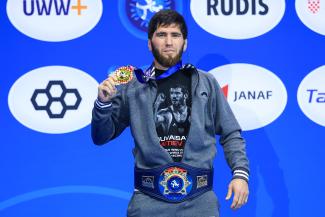
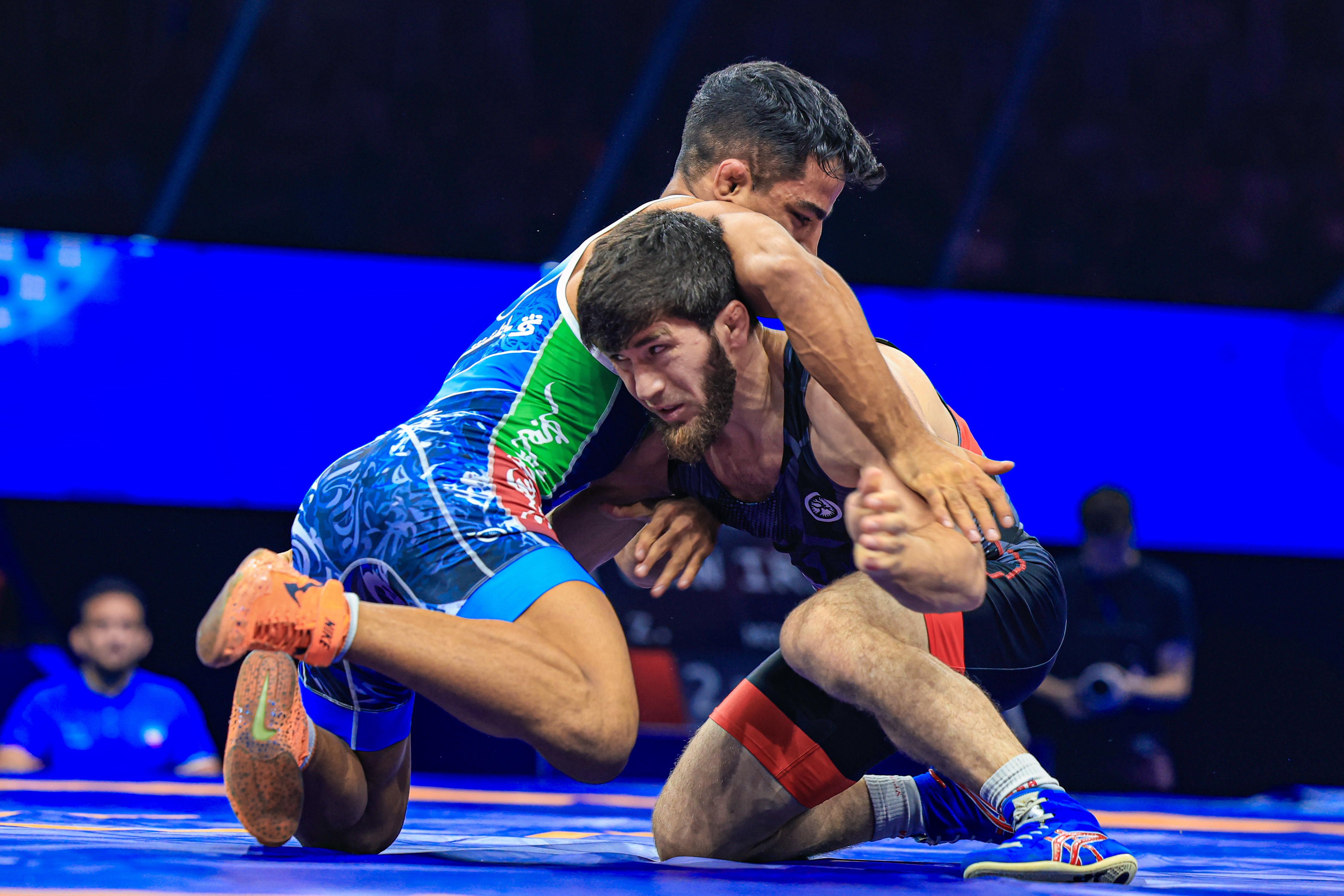 Zavur UGUEV (UWW) tries to score against Ahmad JAVAN (IRI) in the 61kg final. (Photo: United World Wrestling / Amirreza Aliasgari)
Zavur UGUEV (UWW) tries to score against Ahmad JAVAN (IRI) in the 61kg final. (Photo: United World Wrestling / Amirreza Aliasgari)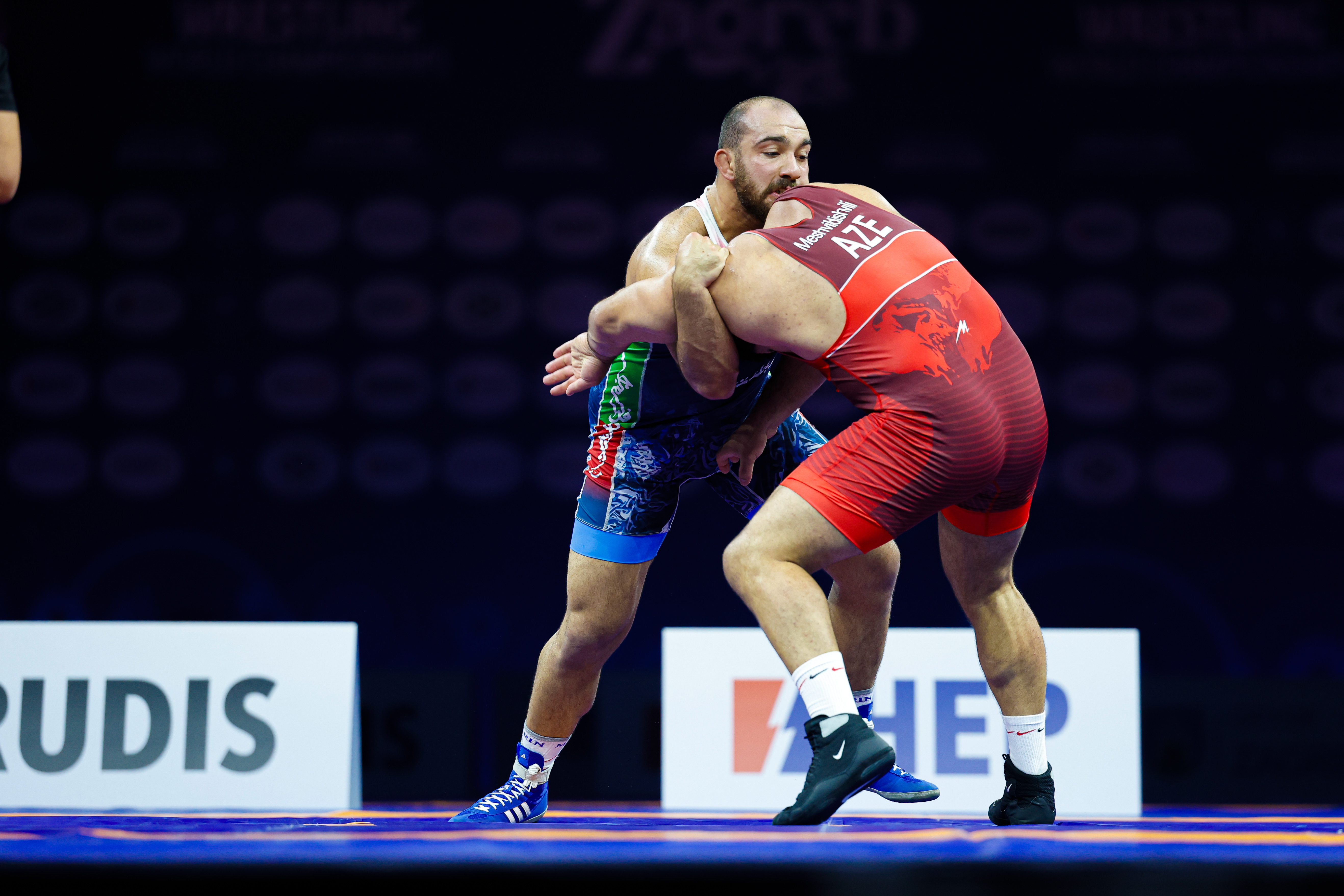 Amir Hossein ZARE (IRI) wrestles Giorgi MESHVILDISHVILI (AZE) in the 125kg final at the World Championships. (Photo: United World Championships / Kostadin Andonov)
Amir Hossein ZARE (IRI) wrestles Giorgi MESHVILDISHVILI (AZE) in the 125kg final at the World Championships. (Photo: United World Championships / Kostadin Andonov)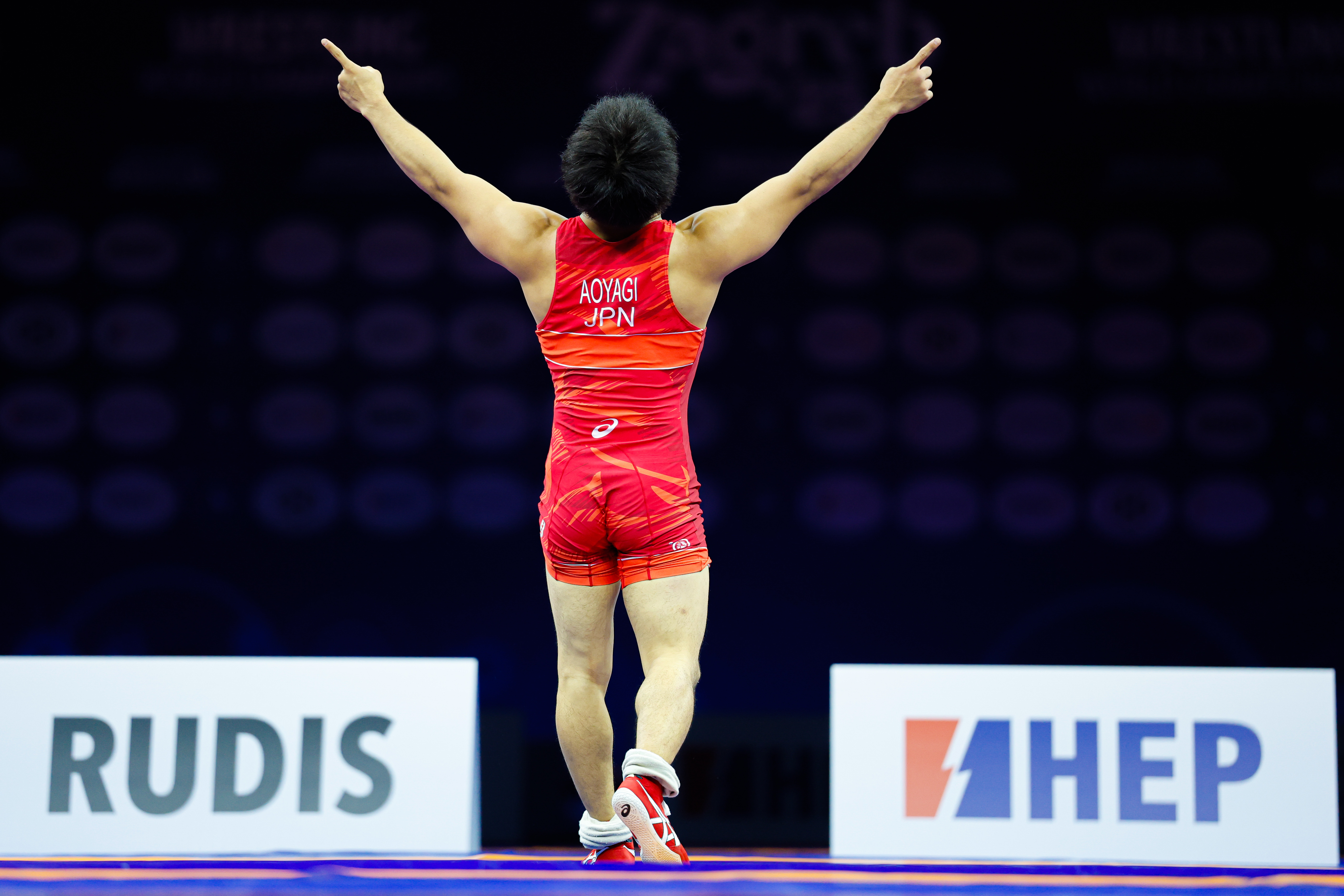 Yoshinosuke AOYAGI (JPN) celebrates after winning the 70kg final. (Photo: United World Wrestling / Kostadin Andonov)
Yoshinosuke AOYAGI (JPN) celebrates after winning the 70kg final. (Photo: United World Wrestling / Kostadin Andonov)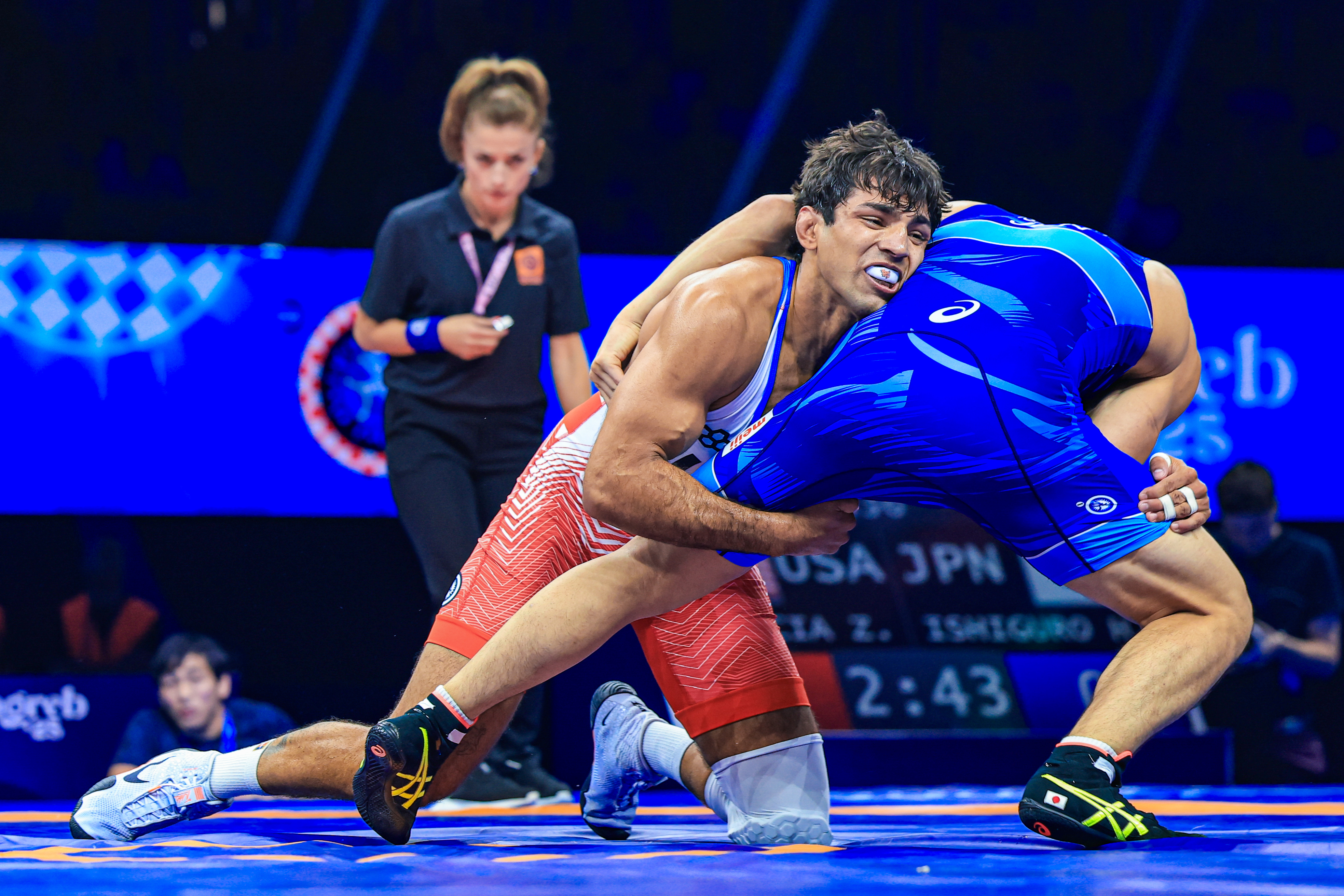 Zahid VALENCIA (USA) scores a takedown against Hayato ISHIGURO (JPN) in the 86kg final. (Photo: United World Wrestling / Amirreza Aliasgari)
Zahid VALENCIA (USA) scores a takedown against Hayato ISHIGURO (JPN) in the 86kg final. (Photo: United World Wrestling / Amirreza Aliasgari)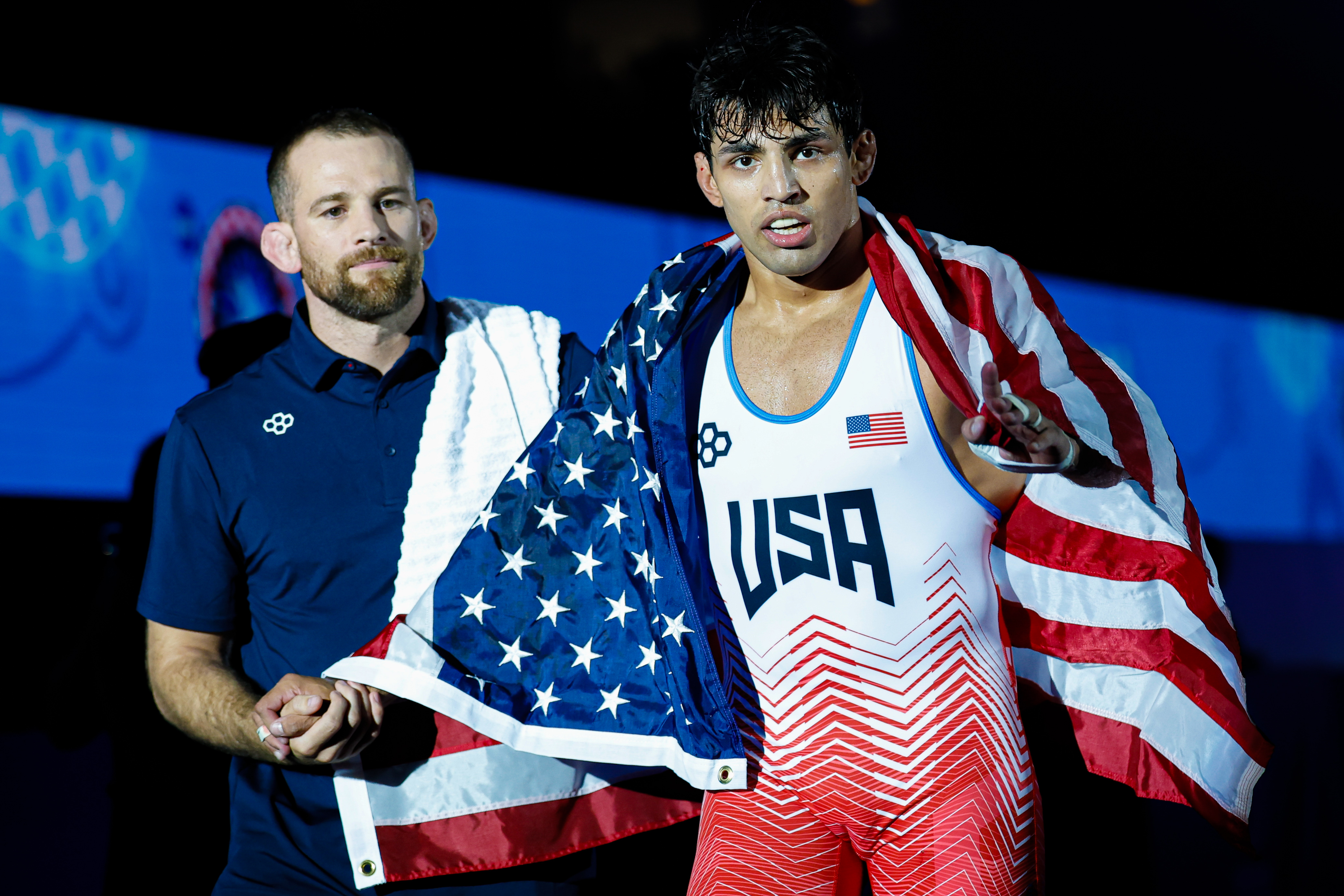 Zahid VALENCIA (USA), right, with coach David TAYLOR, after winning the 86kg final. (Photo: United World Wrestling / Kostadin Andonov)
Zahid VALENCIA (USA), right, with coach David TAYLOR, after winning the 86kg final. (Photo: United World Wrestling / Kostadin Andonov)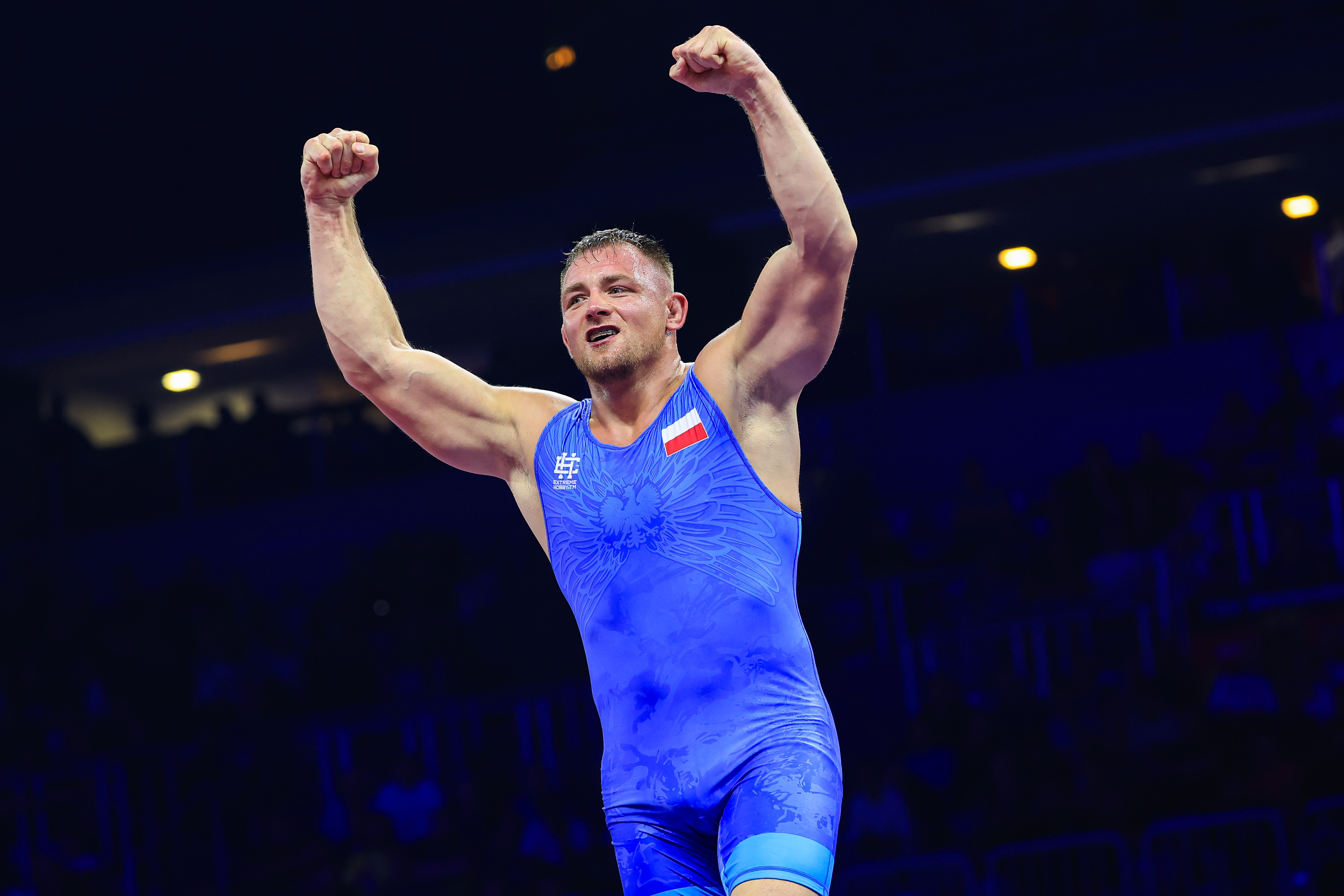 Robert BARAN (POL) celebrates after winning his bronze-medal bout at 125kg. (Photo: United World Wrestling / Kadir Caliskan)
Robert BARAN (POL) celebrates after winning his bronze-medal bout at 125kg. (Photo: United World Wrestling / Kadir Caliskan)
Share your thoughts.
Comments